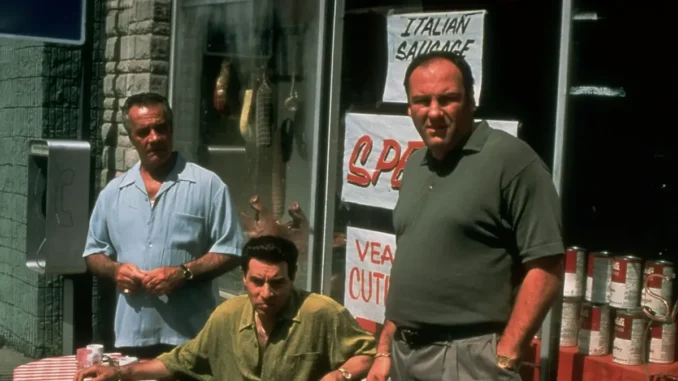
The Magic of the Lovable Bad Guy
Let’s face it: Tony Soprano is a monster. He’s a mob boss who kills without remorse, cheats on his wife, and has some seriously questionable morals. Yet, somehow, we find ourselves rooting for him. Why? This paradox is at the heart of what makes The Sopranos a groundbreaking series. Tony’s complexity pulls us in, making us question our own values while we binge-watch his life unfold.
Alex Gibney, the director of the new documentary Wise Guy: David Chase and The Sopranos, explains this phenomenon well. “The three-way relationship between David Chase, Jim Gandolfini, and Tony Soprano is something extraordinary,” he says. This trio formed a unique bond that shaped the show’s success, making Tony both relatable and repulsive at the same time.
But what exactly creates this magnetic draw toward such a flawed character? It’s a combination of great writing, brilliant casting, and deep emotional exploration—elements that are increasingly hard to find in modern television.
The Creative Process Behind the Scenes
How The Sopranos Came to Life
When David Chase set out to create The Sopranos, he didn’t just want to tell another gangster story. He wanted to explore the psychological depth of his characters. The show’s roots lie in Chase’s complicated relationship with his mother, which influenced the portrayal of family dynamics throughout the series.
Gibney points out that this kind of emotional grounding is crucial in storytelling. “You go from something very personal and transform it into a show about a mobster having panic attacks,” he explains. This unique angle allowed viewers to connect with Tony on a human level, making his struggles with identity and mental health resonate deeply.
Casting: The Heart of the Show
One of the most compelling aspects of The Sopranos was its stellar cast. The choice of actors played a significant role in bringing Chase’s vision to life. Finding the right Tony and Carmela wasn’t easy; it required an intuitive understanding of character. As Gibney notes, sometimes it comes down to small things—like how an actor says a single word—that can make all the difference.
Take Drea de Matteo, for example. Chase cast her because of how she pronounced “ow.” It’s these little quirks that can elevate a performance from good to iconic. The chemistry among the cast is palpable, making the emotional stakes feel real.
The Cultural Impact of The Sopranos
A New Era in Television
When The Sopranos premiered in 1999, it revolutionized the television landscape. HBO was breaking free from the traditional networks that dominated the scene, offering a platform for more complex, adult storytelling. In an age where networks prioritized viewer comfort, HBO took the plunge into morally ambiguous narratives.
As Gibney mentions, “HBO wanted to speak directly to consumers.” This shift created space for stories that challenged conventions and sparked discussions about morality, loyalty, and family. The show’s success opened the floodgates for more original programming, paving the way for series like Breaking Bad and The Wire.
Could It Happen Today?
Fast forward to 2024, and one can’t help but wonder: can we replicate the magic of The Sopranos today? Gibney believes that while it’s tough, it’s not impossible. “We might see something as original on a different platform,” he says. The key is finding networks willing to take risks, similar to what HBO did in the late ‘90s.
Today’s television landscape is dominated by streaming platforms, but many seem hesitant to push the envelope. While we have fantastic shows, they often lack the daring complexity that characterized The Sopranos. It’s a waiting game, but the next great series may just be around the corner.
The Essence of a Great Show
A Fine Line Between Right and Wrong
At its core, The Sopranos explores the human condition and the gray areas of morality. Tony’s charming yet violent nature forces viewers to confront uncomfortable truths about themselves. Why do we root for a man who does terrible things? This question is what elevates the show beyond mere entertainment.
This complexity resonates with audiences who find themselves in morally ambiguous situations in their own lives. As Gibney points out, the essence of the mystery of who we are as human beings is captured beautifully through Tony’s character. He’s a reflection of our inner struggles, which is why we can’t help but empathize with him—even when he does the unthinkable.
Comparing with Other Greats
When you look at other groundbreaking series like The Wire and Six Feet Under, you’ll notice similar themes of morality and complexity. What makes The Sopranos stand out, however, is its unique blend of dark humor and psychological depth.
Characters like Tony Soprano or Omar Little from The Wire exist in that morally gray area, making them both compelling and relatable. It’s a delicate balance, but when executed well, it creates timeless storytelling that leaves a lasting impact.
Conclusion
The Sopranos remains a monumental piece of television history, and its legacy continues to influence creators today. Through the lens of Alex Gibney’s documentary, we get a deeper understanding of the artistry involved in crafting such an iconic series. The blend of complex characters, rich storytelling, and the exploration of morality keeps us captivated long after the final credits roll.
As we look forward to the future of television, we can only hope that the next great show captures the same raw emotion and innovative spirit that The Sopranos brought to the screen.
